Hundreds Gather in Tucson for the Largest Indigenous Data Sovereignty (IDSov) Event in History
The 2024 U.S. Indigenous Data Sovereignty & Governance Summit brought together Indigenous scholars, Tribal leaders, data practitioners and allies in a forum dedicated to moving Indigenous self-determination on data governance forward.

Networking opportunities abound at the 2024 IDSov & IDGov Summit.
For the scholars and academics working in the emergent fields of North American Indigenous Data Sovereignty (IDSov) and Indigenous Data Governance (IDGov), a meeting of the minds was long overdue.
It had been nearly five years since the last gathering of U.S. experts, Tribal leaders and data practitioners at Arizona State University (ASU) in Tempe, Arizona in April 2019, and almost seven years since the first gathering of its kind in the United States at UCLA in 2017.
In the meantime, the IDSov/IDGov movements – which hold that Indigenous Peoples are entitled to exercise their sovereign rights to control the collection, application and use of data about their citizens, lands and cultures – had been steadily gaining steam and international recognition.
Building Momentum for IDSov and IDGov
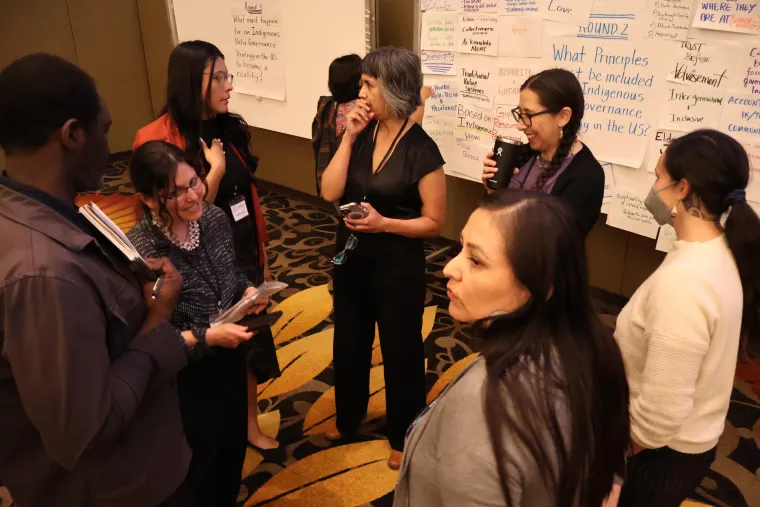
Summit organizers huddle during the pre-conference Tribal Leaders and Scholars Workshop.
Just a few months after the ASU event, July 2019 saw the founding of the Global Indigenous Data Alliance (GIDA). A few months later, GIDA endorsed and published the CARE Principles for Indigenous Data Governance, calling on researchers and other data actors to ensure that their data and related policies and practices provide “Collective benefit,” that Indigenous Peoples retain the “Authority to control” the data to which they relate, and that data be gathered and managed “Responsibly” and “Ethically.”
The CARE Principles were created in response and as a complement to increasing calls in the scientific community to make data “Findable, Accessible, Interoperable and Reusable” (FAIR); a call that many researchers saw as antithetical to the basic privacy interests and inherent sovereignty of Indigenous Peoples who had long been targets of extractive and harmful research practices.
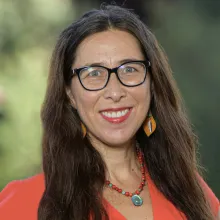
Stephanie Russo Carroll (Ahtna)
The fall of 2020 marked the publication of the book Indigenous Data Sovereignty and Policy by GIDA members Maggie Walter (Palawa from Lutruwita/Tasmania), Tahu Kukutai (Māori, of Ngāti Tīpā, Ngāti Mahanga, Ngāti Kinohaku, Ngāti Ngawaero and Te Aupōuri descent), Stephanie Russo Carroll (Ahtna, Native Village of Kluti-Kaah) and Desi Small-Rodriguez (Northern Cheyenne and Chicana), and the CARE Principles were published in multiple peer-reviewed journals on data, genomic research, medicine, ecology and more over the ensuing years.
Then, in 2023, GIDA transitioned the IDSov and IDGov conversation from one of general “principles” to one of “inherent rights” with the publication of the “12 Indigenous Peoples’ Rights in Data.”
So, when the U.S. Indigenous Data Sovereignty Network (USIDSN) decided to rally their rolodex of Indigenous scholars, Tribal leaders and other data actors for an international summit scheduled for the spring of 2024, it turned out that the public appetite for actionable conversations on the topic was greater than the organizers imagined.
The 2024 U.S. Indigenous Data Sovereignty & Governance Summit
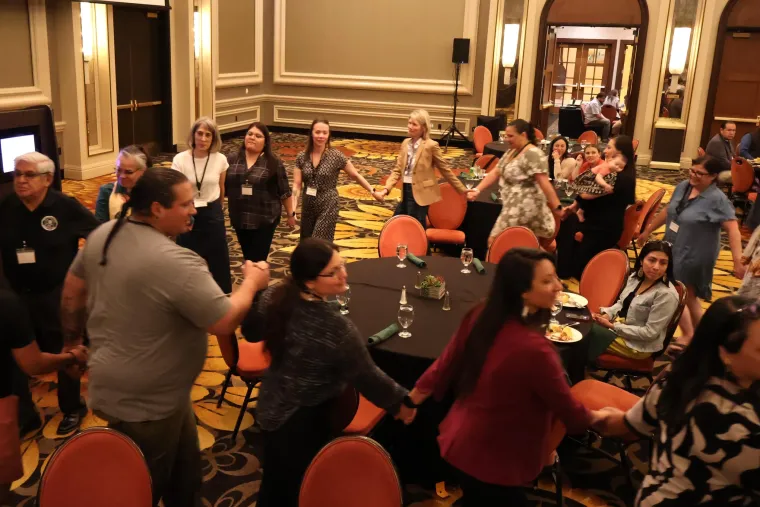
The Akimel O'odham dance group Chi'Chino Spirit brought the crowd to their feet.
An open call for proposals in October 2023 yielded more than 70 responses and it soon became clear that interest in IDSov & IDGov had grown substantially since the previous U.S. events.
When the organizers initially secured their contract with the Pascua Yaqui Tribe’s Casino Del Sol to host the U.S. Indigenous Data Sovereignty & Governance Summit, they expected a maximum of 300 attendees.
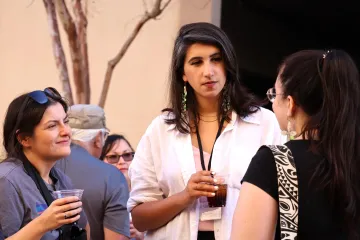
Mingling at the opening night mixer sponsored by the UArizona Indigenous Resilience Center.
But when registrations sold out in a matter of weeks, the team was forced to quickly pivot to meet the demand. After reconfiguring their agenda, redesigning the layout for the event and adding a virtual option, organizers were able to roughly double their capacity.
Ultimately, the 2024 Summit attracted 450 attendees to the lands of the Pascua Yaqui Tribe and the homelands of the Tohono O’odham Nation, as well as another 200+ individuals who attended remotely or took part in watch parties during the April 11-12 event.
Participants ranged in age from five months to elders and included representatives of dozens of Tribes, Native nations and Iwi including Indigenous Peoples from Aotearoa (New Zealand), Australia, Canada, Mexico, all regions in the mainland United States, Alaska, Hawai'i, the Caribbean and several island nations from around the world.
“We were really blown away by the interest generated by this event,” says Summit project manager and Collaboratory for Indigenous Data Governance Research Coordinator Andrew Martinez (Salt River Pima-Maricopa Indian Community). “It’s incredibly motivating and, at the same time, humbling to see the IDSov movement growing the way it is, and to play a role in bringing everyone together to figure out how to take it to the next level.”
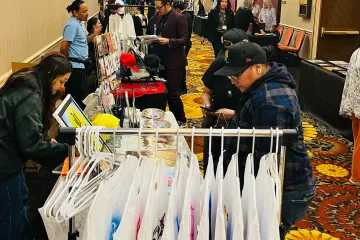
An Indigenous market offered the opportunity to shop for souvenirs during down time.
Attendees enjoyed their choice of more than 50 oral presentations, 18 roundtable discussions, nine lightning talks, and six “unconference” sessions to engage with.
An opening-night reception sponsored by the UArizona Indigenous Resilience Center on Wednesday, April 10 offered Summit-goers the chance to mingle and network with friends and colleagues before the official start of the event.
Meals were included with registration and served buffet style as performers like the traditional Akimel O’odham dance group Chi’Chino Spirit, musician Daniel French (Kanien'kehá:ka and Chicano), Deer Dancers from the Pascua Yaqui Tribe and the Cozad Drum Group of the Kiowa Tribe of Oklahoma blessed those present with contemporary and traditional music and dance.
An Indigenous Marketplace featuring local Native artists, artisans and entrepreneurs provided respite from the academic hustle and bustle, as well as the chance to shop for gifts to bring home.
An Inclusive Movement
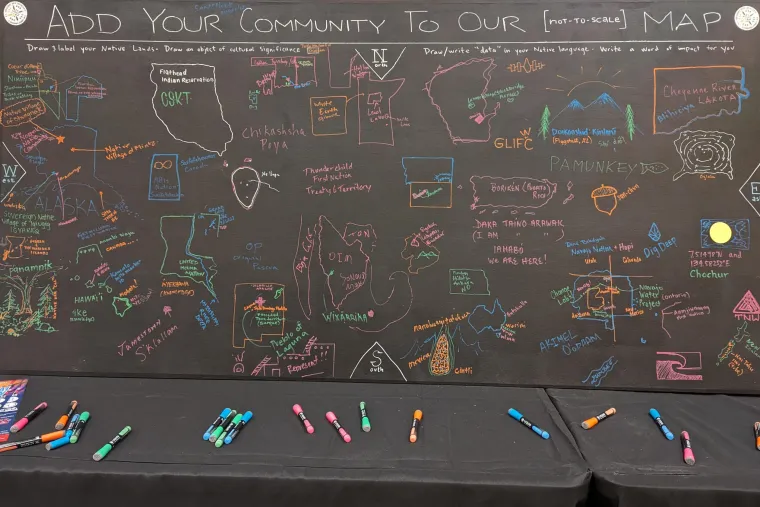
A chalkboard map invited attendees to share information about their home communities.
In alignment with the greater IDSov movement, the Indigenous-led team that planned, organized and executed the 2024 U.S. IDSov & IDGov Summit took “an inclusive view of Indigenous Peoples in the U.S., to include federally, state, un-recognized Tribes, and peoples of Hawai'i, Guåhan (Guam), Borikén (Puerto Rico), Northern Mariana Islands, American Samoa and U.S. Virgin Islands.”
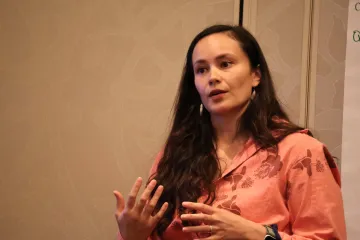
NNI Researcher Riley Taitingfong (Chamoru) presents at the Summit.
Says Summit organizer, IDSov scholar, and GIDA and USIDSN co-founder Stephanie Russo Carroll (Ahtna/Native Village of Kluti-Kaah), “The inherent rights of Indigenous Peoples to steward the data to which they relate is not dependent on their formal recognition by settler colonial interests.” Carroll also holds dual appointments as an Associate Professor in both the UArizona Udall Center for Studies in Public Policy and the Mel and Enid Zuckerman College of Public Health.
And, as pointed out by UArizona Native Nations Institute Luce Foundation Postdoctoral Researcher and Summit organizer Riley Taitingfong (Chamoru), “Movements for Indigenous self-determination are active in the U.S. territories and IDSov will be strengthened through collaboration with everyone who is engaged in those efforts.”
Day two of the Summit featured a Roundtable devoted specifically to understanding unique challenges, and building IDSov and cross-movement solidarity among attendees with connections to the U.S. territories and federally unrecognized Tribes.
Building Action and Power
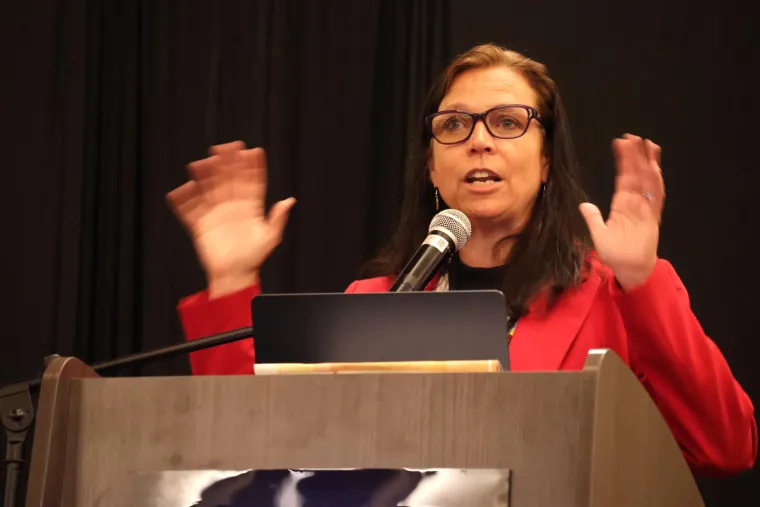
Director of the NIH Tribal Health Research Office Karina L. Walters (Choctaw Nation of Oklahoma) delivers her keynote address.
Where earlier IDSov events focused largely on agenda setting and foundation building, recent academic progress in this field meant that individuals at the 2024 gathering could turn their attention to more concrete governance objectives.
The primary goals outlined for the convening were to take action towards:
- Establishing an Indigenous data governance strategy in the U.S.,
- Creating an Indigenous data standard via nation-to-nation partnerships between Indigenous Peoples and the federal government, and
- Enhancing Indigenous Peoples’ laws, policies, and systems for IDSov led by their own priorities, visions and strengths for our shared data futures.
To ensure they set the right tone and focused on the correct priorities from the outset, organizers held an invite-only pre-conference workshop with 60 Tribal leaders and scholars the day before conference sessions officially began.
Keynote speakers during the main conference included:
- Maggie Walter (Palawa), Distinguished Professor Emerita, University of Tasmania
- Kirikowhai Mikaere (Te Arawa–Tūhourangi, Ngāti Whakaue), Lead Technical Advisor, National Iwi (Tribal) Chairs Forum – Data Leadership Group
- Chief Benjamin Barnes of the Shawnee Tribe
- Karina L. Walters, Ph.D., M.S.W. (Choctaw Nation of Oklahoma), Director of the NIH Tribal Health Research Office, National Institute of Health
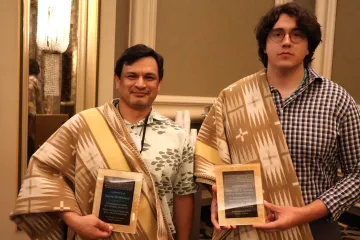
UCLA's Randall Akee and UArizona Public Health doctoral candidate William Carson (Ohkay Owingeh Pueblo) accept Data Warrior Awards on behalf of deceased honorees.
The final evening of the Summit struck a reverential note as three “Data Warriors” – a Data Practitioner, a Tribal Leader, and an Unwavering Data Ally – were honored posthumously for their contributions to the field. The awards were announced and handed out by Summit organizer and UCLA DataWarriors Lab Director Desi Small-Rodriguez. Scholarships for Indigenous students were also established in the name of each of the following 2024 Data Warrior honorees:
- Nicole Ducheneaux (Cheyenne River Lakota) – Data Practitioner and Tribal Attorney
- Honorable Joe A. Garcia – Tribal Leader and Former Governor of Ohkay Owingeh Pueblo
- Norm DeWeaver – Data Ally and Former Director of the Center for Community Change
An Indigenous-only discussion session also took place at the conclusion of the Summit’s official program to allow Indigenous scholars and Tribal leaders to debrief and realign priorities before returning home.
Just the Beginning
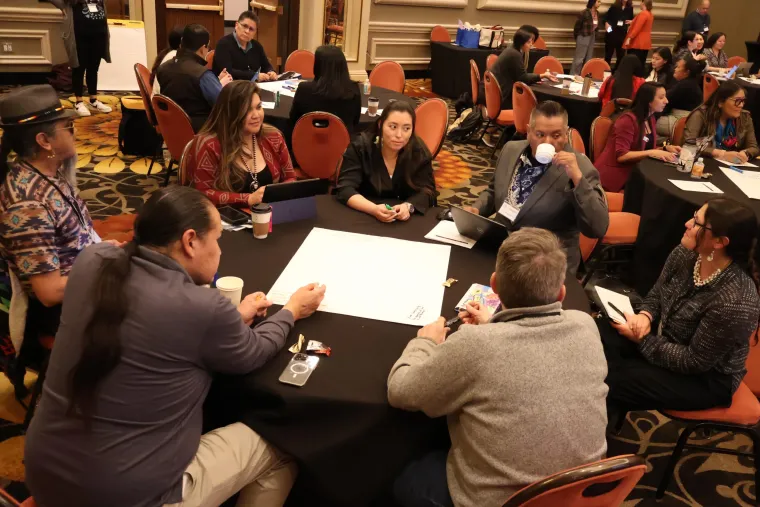
Summit attendees participate in a group work session.
For many in attendance, the 2024 U.S. IDSov & IDGov Summit was something of a homecoming.
“I’ve felt very comfortable and at home (at this Summit), and I’m relieved that these conversations are finally happening,” said Executive Director and Vice President of the Native BioData Consortium Joseph Yracheta (P'urhépecha).
“I feel like I connected with relatives I didn’t know I had,” said Grief & Death Doula and 2023-24 Indigenous DataSET Fellow Candi Inez-Cipactli Corral (Cahita, Tahues, Mexica) of her experience at the event. “I felt welcomed, safe. It’s just been amazing, overall, and so radically different from mainstream conferences.“
The event offered Indigenous scholars, leaders and other data practitioners the chance to speak freely about their concerns and visions for a collective data future that recognizes the inherent sovereignty of Indigenous Peoples and their inalienable right to control and steward any and all data about and related to their citizens, cultures and lands.
“Being able to center Tribal people, their culture and their wishes about data and research… to come to some consensus about what all of that means in the current landscape of big data, artificial intelligence and genomic research is important because (this field) is just moving so fast… and we don’t want Tribes to get left behind,” offered Yracheta, who also participated as a Summit organizer.
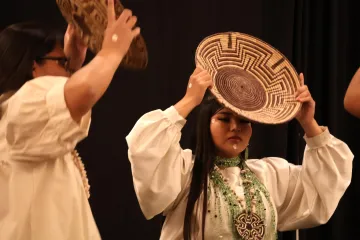
The Chi'Chino Spirit dance group performs a traditional Akimel O'odham basket dance.
Though it addressed a global desire for the chance to engage in conversations about IDSov and IDGov at a pivotal time in the movement, the 2024 Summit by no means satiated the public hunger for continued engagement and discussion in this area.
Organizers found it telling that attendees were already asking for details about the next gathering – tentatively scheduled for sometime in 2026 – before this one was in the rearview mirror.
The 2024 U.S. IDSov & IDGov Summit was produced in partnership between the following organizations:
- U.S. Indigenous Data Sovereignty Network
- Native Nations Institute at the University of Arizona
- Collaboratory for Indigenous Data Governance
- Indigenous Land & Data Stewards Lab at Colorado State University
- UCLA American Indian Studies Center
- Native BioData Consortium
- Data Warriors Lab
- Seven Directions: A Center for Indigenous Public Health at the University of Washington
- Albuquerque Area Southwest Tribal Epidemiology Center
Summit sponsors included:
- Native BioData Consortium
- Center for Indigenous Health at Johns Hopkins University
- First Nations Development Institute
- The Rockefeller Foundation
- Udall Center for Studies in Public Policy at the University of Arizona
- Native Nations Institute at the University of Arizona
- Confluencenter for Creative Inquiry at the University of Arizona
- Agnese Nelms Haury Program in Environment & Social Justice at the Arizona Institute for Resilience, University of Arizona
- Henry Luce Foundation
- Kellogg's
- Kamehameha Schools
- Indigenous Resilience Center at the Arizona Institute for Resilience, University of Arizona
Albuquerque Area Southwest Tribal Epidemiology Center
Click here to see more photos from the 2024 IDSov & IDGov Summit.

